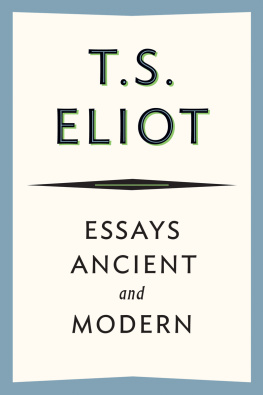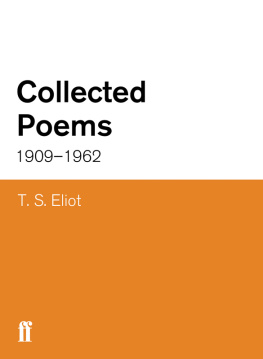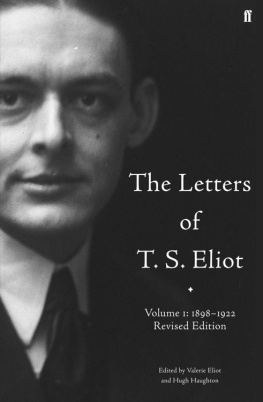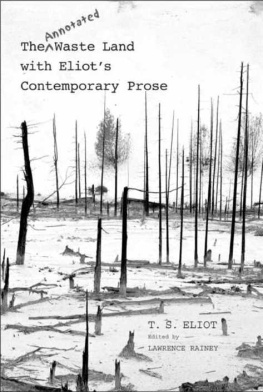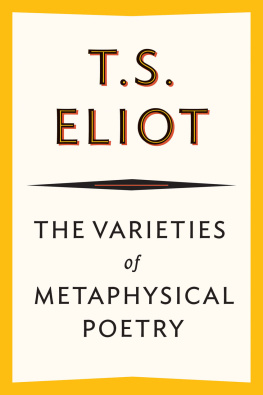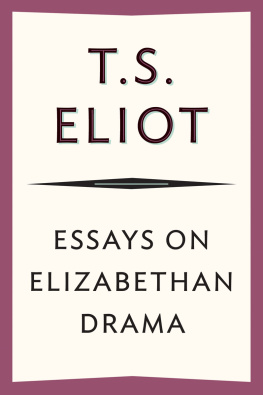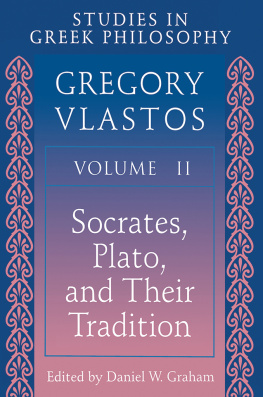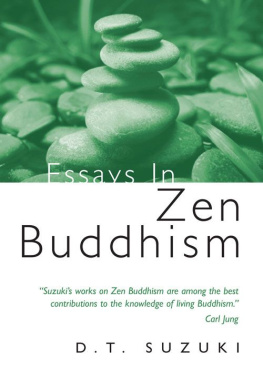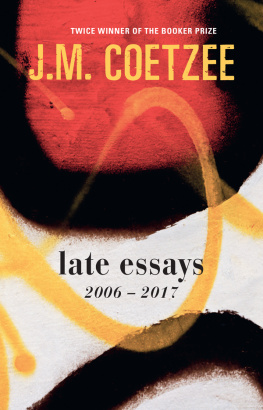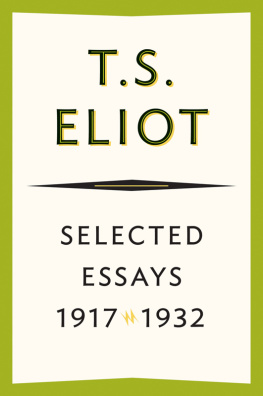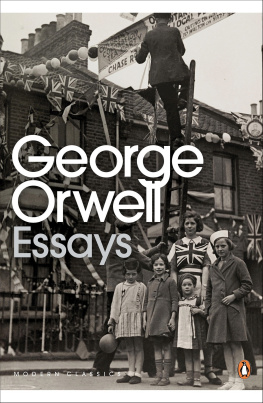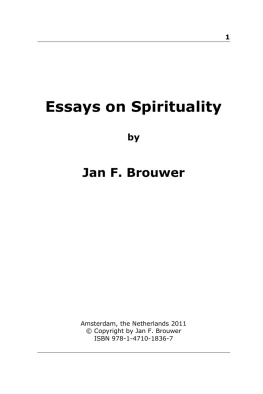COPYRIGHT, 1932, 1936, BY HARCOURT, BRACE AND COMPANY, INC.
All rights reserved, including the right to reproduce this book or portions thereof in any form.
For information about permission to reproduce selections from this book, write to or to Permissions, Houghton Mifflin Harcourt Publishing Company, 3 Park Avenue, 19th Floor, New York, New York 10016.
hmhbooks.com
Library of Congress Cataloging-In-Publication data is on file.
eISBN 978-0-544-35853-9
v2.0421
Preface
A VOLUME of essays entitled For Lancelot Andrewes has gone out of print, after some eight years, and a new edition was proposed. I have taken the opportunity of changing the title, which has served its turn, of omitting the preface, which has more than served its turn, and of omitting three essays, those on Middleton, Crashaw, and Machiavelli. On the other hand I have added five essays not previously collected: Religion and Literature, Catholicism and International Order, The Penses of Pascal, Modern Education and the Classics, and In Memoriam.
I renew my acknowledgment of obligation to the editors of The Times Literary Supplement, Theology, The Dial (New York), and The Forum (New York) on account of essays which appeared in the earlier volume. Religion and Literature was originally given as one of a series of addresses arranged in 1934 by the Rev. V. A. Demant and published together as a volume called Faith That Illuminates (The Centenary Press). Catholicism and International Order was an address delivered to the Anglo-Catholic Summer School of Sociology at Oxford in 1933, and was printed in Christendom. The Penses of Pascal appears as the Introduction to the English translation of that work published in the Everyman Library. Modern Education and the Classics is the revision of an address delivered to the Classical Club of Harvard University in 1933, and hitherto unprinted. In Memoriam is the expanded version of an introduction written for the Nelson Classics edition of Poems of Tennyson. To the several editors and publishers I wish to make grateful acknowledgment.
I am aware that most of these papers date themselves, even when I have forgotten the dates. It may well be that in a few years time I may wish to remove some from currency, as I have in the past; but I may remark that nothing that has happened in more recent times has caused me to wish to modify in a more favourable sense my comments on the League of Nations in Catholicism and International Order. The note on Baudelaire antedates the longer paper printed in my Selected Essays, and our time is perhaps over: nevertheless the note seemed to me worth preserving for the moment. I observe that the advertisement of For Lancelot Andrewes advanced the claim that the essays had a unity of their own. I do not know whether my ideals of unity are higher, or merely my pretensions more modest, than eight years ago; I offer this book, as the title implies, only as a miscellaneous collection, having no greater unity than that of having been written by the same person.
T. S. E.
Lancelot Andrewes
THE Right Reverend Father in God, Lancelot Bishop of Winchester, died on September 25th, 1626. During his lifetime he enjoyed a distinguished reputation for the excellence of his sermons, for the conduct of his diocese, for his ability in controversy displayed against Cardinal Bellarmine, and for the decorum and devotion of his private life. Some years after Andrewess death, Lord Clarendon, in his History of the Rebellion, expressed regret that Andrewes had not been chosen instead of Abbott to the Archbishopric of Canterbury, for thus affairs in England might have taken a different course. By authorities on the history of the English Church Andrewes is still accorded a high, perhaps the highest, place; among persons interested in devotion his Private Prayers are not unknown. But among those persons who read sermons, if they read them at all, as specimens of English prose, Andrewes is little known. His sermons are too well built to be readily quotable; they stick too closely to the point to be entertaining. Yet they rank with the finest English prose of their time, of any time. Before attempting to remove the remains of his reputation to a last resting place in the dreary cemetery of literature, it is desirable to remind the reader of Andrewess position in history.
The Church of England is the creation not of the reign of Henry VIII or of the reign of Edward VI, but of the reign of Elizabeth. The via media which is the spirit of Anglicanism was the spirit of Elizabeth in all things; the last of the humble Welsh family of Tudor was the first and most complete incarnation of English policy. The taste or sensibility of Elizabeth, developed by her intuitive knowledge of the right policy for the hour and her ability to choose the right men to carry out that policy, determined the future of the English Church. In its persistence in finding a mean between Papacy and Presbytery the English Church under Elizabeth became something representative of the finest spirit of England of the time. It came to reflect not only the personality of Elizabeth herself, but the best community of her subjects of every rank. Other religious impulses, of varying degrees of spiritual value, were to assert themselves with greater vehemence during the next two reigns. But the Church at the end of the reign of Elizabeth, and as developed in certain directions under the next reign, was a masterpiece of ecclesiastical statesmanship. The same authority that made use of Gresham, and of Walsingham, and of Cecil, appointed Parker to the Archbishopric of Canterbury; the same authority was later to appoint Whitgift to the same office.
To the ordinary cultivated student of civilization the genesis of a Church is of little interest, and at all events we must not confound the history of a Church with its spiritual meaning. To the ordinary observer the English Church in history means Hooker and Jeremy Taylorand should mean Andrewes also: it means George Herbert, and it means the churches of Christopher Wren. This is not an error: a Church is to be judged by its intellectual fruits, by its influence on the sensibility of the most sensitive and on the intellect of the most intelligent, and it must be made real to the eye by monuments of artistic merit. The English Church has no literary monument equal to that of Dante, no intellectual monument equal to that of St. Thomas, no devotional monument equal to that of St. John of the Cross, no budding so beautiful as the Cathedral of Modena or the basilica of St. Zeno in Verona. But there are those for whom the City churches are as precious as any of the four hundred odd churches in Rome which are in no danger of demolition, and for whom St. Pauls, in comparison with St. Peters, is not lacking in decency, and the English devotional verse of the seventeenth centuryadmitting the one difficult case of conversion, that of Crashawfiner than that of any other country or communion at the time.
The intellectual achievement and the prose style of Hooker and Andrewes came to complete the structure of the English Church as the philosophy of the thirteenth century crowns the Catholic Church. To make this statement is not to compare the Laws of Ecclesiastical Polity with the Summa. The seventeenth century was not an age in which the Churches occupied themselves with metaphysics, and none of the writings of the fathers of the English Church belongs to the category of speculative philosophy. But the achievement of Hooker and Andrewes was to make the English Church more worthy of intellectual assent. No religion can survive the judgment of history unless the best minds of its time have collaborated in its construction; if the Church of Elizabeth is worthy of the age of Shakespeare and Jonson, that is because of the work of Hooker and Andrewes.

